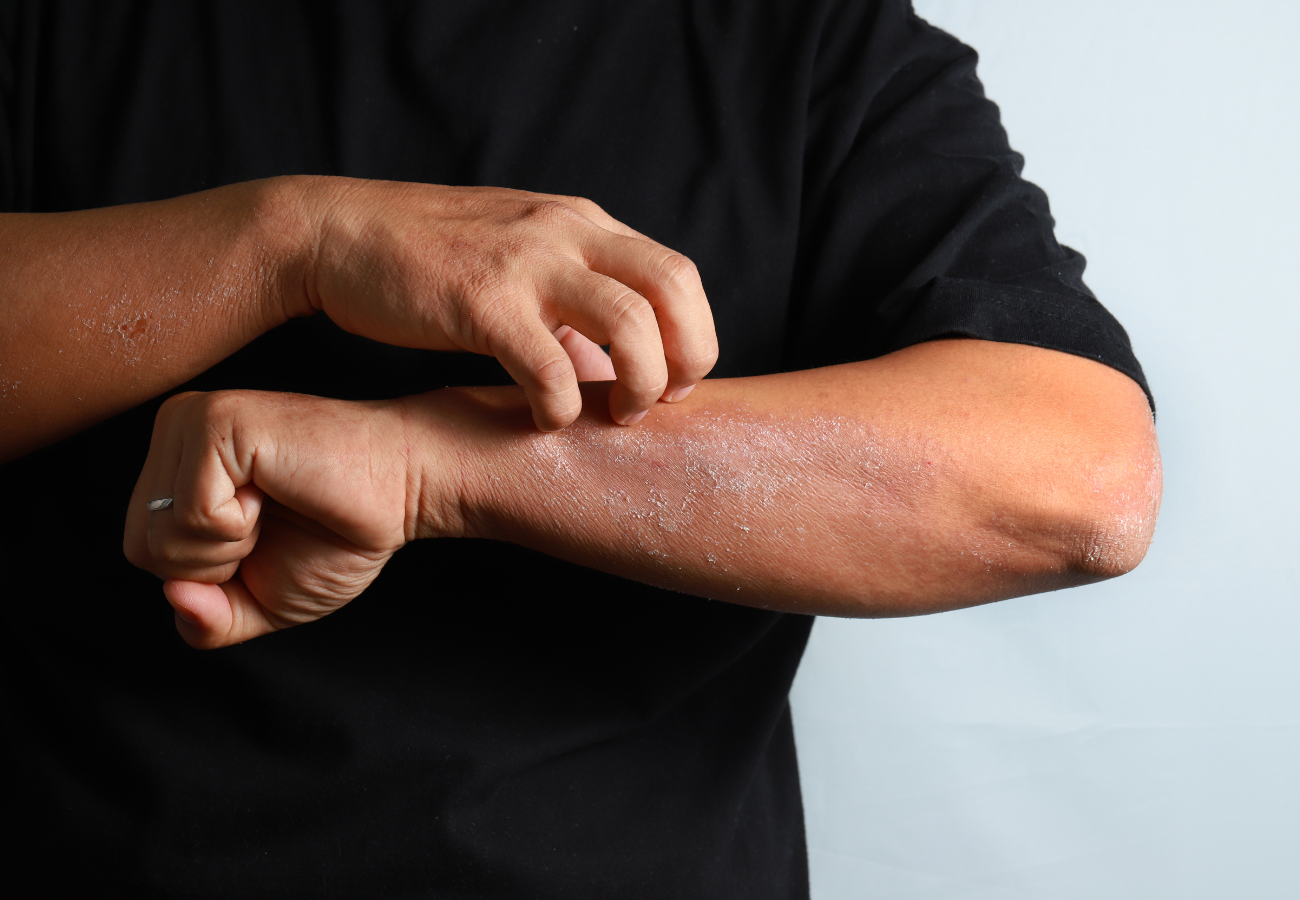Eczema, also known as atopic dermatitis, is a chronic skin condition that affects millions of people worldwide.
While its root causes involve a mix of genetics and immune system function, many people find themselves asking, “Why is my eczema getting worse?”
The answer often lies in a combination of external and internal triggers. Certain foods, lifestyle habits, environmental conditions, and even allergies can all exacerbate eczema symptoms.
Understanding these eczema risk factors can help you better manage flare-ups, reduce irritation, and improve your skin health over time. Below, we’ll explore the most common reasons eczema flares up and what you can do about them.
Dietary Triggers: Foods That Affect Eczema
One area that often surprises people is the significant impact that diet can have on skin health. While not everyone experiences eczema due to dietary causes, certain foods are known to trigger inflammation and exacerbate eczema rashes.
Some common foods that affect eczema include:
- Dairy products (milk, cheese, yogurt)
- Eggs
- Gluten-containing grains
- Soy
- Shellfish and fish
- Nuts
- Highly processed foods with artificial additives
These foods may act as inflammatory triggers or allergens in some individuals, worsening eczema and allergies. Not everyone with eczema needs to avoid these foods, but if you notice consistent flares after eating certain items, it may be worth discussing an elimination diet with your dermatologist or allergist.
Eczema Caused by Weather: Seasonal Changes and Triggers
One of the most common questions dermatologists hear is whether eczema is worse in summer or winter. The truth is, both extremes can create challenges for people with eczema.
Winter flares: Cold, dry air combined with indoor heating strips the skin of moisture, leading to increased dryness, itching, and cracking.
Summer flares: Heat, sweat, and humidity can irritate sensitive skin. Chlorine from pools and exposure to UV rays may also worsen symptoms.
Eczema flare-ups caused by weather factors make it essential to adjust your skincare routine with the seasons—adding richer moisturizers in winter and lighter, sweat-friendly options in summer.
Environmental Risk Factors: Everyday Irritants
Beyond diet and weather, daily environmental exposures can also exacerbate eczema symptoms. Common culprits include:
- Harsh soaps and detergents that strip away the skin barrier
- Fragrances and dyes in laundry products or skincare items
- Dust, mold, and pollen, which can worsen both eczema and allergies
- Clothing fibers like wool or synthetics that trap sweat and cause friction
These irritants often damage the skin’s protective barrier, making it harder for eczema-prone skin to heal and resist triggers. Switching to fragrance-free, sensitive-skin products and wearing breathable fabrics, such as cotton, can help reduce flare-ups.
Lifestyle and Eczema: How Daily Habits Impact Skin
When discussing lifestyle and eczema, it’s essential to recognize that habits beyond diet and environment can significantly impact symptoms. Stress, lack of sleep, and certain routines all play a role.
Stress and mental health: High stress levels can activate the immune system, leading to increased inflammation that may exacerbate eczema.
Sleep deprivation: Poor rest leads to increased stress hormones and disruption of the skin barrier.
Excessive bathing: Hot showers and prolonged baths strip natural oils, leading to increased dryness and irritation.
Exercise: While healthy overall, excessive sweating can exacerbate an eczema rash if not managed properly.
Making small changes—such as practicing stress-reduction techniques, getting adequate rest, and showering with lukewarm water—can significantly reduce eczema flares.
Allergies and Coexisting Conditions
For many, eczema and allergies often co-occur. This link is sometimes called the "atopic triad," where eczema, asthma, and allergic rhinitis occur together. Allergic responses to pollen, dust mites, or certain foods can exacerbate skin inflammation and worsen eczema symptoms.
Other skin conditions can also complicate eczema. For example, fungal or bacterial infections may spread more easily when the skin barrier is weakened by eczema. This can lead to increased redness, oozing, and itching, making the chronic condition feel more severe.
When to See a Dermatologist
If your eczema rash seems to flare up constantly despite lifestyle adjustments, or if you’re unsure about the dietary causes of eczema, a dermatologist can help identify triggers and recommend effective treatments. Prescription creams, phototherapy, or newer biologic medications may be necessary for more severe or persistent cases.
While there’s no cure for eczema, understanding and avoiding your personal eczema risk factors can help minimize flares and improve quality of life.
Eczema is a complex chronic skin condition, and there’s rarely one single cause behind flare-ups. Instead, multiple factors—ranging from diet and weather to allergens and lifestyle habits—can exacerbate eczema symptoms. By recognizing these triggers, adjusting your daily routines, and seeking professional guidance when needed, you can better control flare-ups and maintain healthier skin year-round. Contact the Dermatology Partners team today to help manage your eczema effectively. Call us at (888) 818-DERM or book your appointment online.



